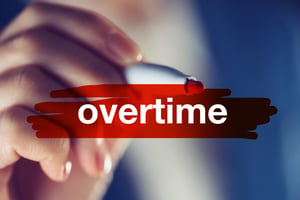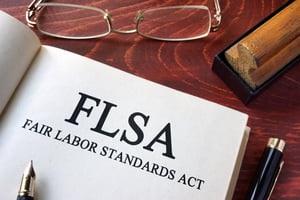New regulations and frequently changing labor laws on national, state, and local levels make managing Human Resources more challenging than ever before. We’ve made it easy with a checklist including some of the most important HR tasks, related to payroll, benefits, and compliance to help small to midsized businesses prepare for Q1 in the New Year.
PAYROLL
Verify Minimum Wage Requirements. Federal law requires non-exempt employees to be paid a minimum wage of $7.25 per hour but this wage rate can vary as many states have passed higher minimum wage laws. In cases where an employee is subject to both the state and federal minimum wage laws, the employee is entitled to the higher of the two minimum wages. Check the wage requirements of the states where you have workers.
Check New Thresholds for FLSA Overtime Rule. On Sept. 24, 2019, the U.S. Department of Labor announced a final rule to make 1.3 million American workers newly eligible for overtime pay. Effective Jan. 1, 2020, the new rule increases the minimum earnings threshold to $35,568 per year to maintain the exempt status for executive, administrative, and professional employees under the Fair Labor Standards Act (FLSA) minimum wage and overtime pay requirements. It allows employers to count a portion of specific bonuses and commissions towards meeting the salary level. Clarify what perks and benefits may be offered to employees without additional overtime risk or liability. Identify employees impacted by the new rule and make necessary adjustments to future hiring plans. Update job descriptions and educate managers about the risks of Wage and Hour violations. Also, keep in mind that some states have higher salary thresholds and different tests for exempt employees. In addition to new overtime thresholds, review all city, county, and state employment laws, including filing requirements for contract workers, freelancers, and remote employees located in other states.
Identify employees impacted by the new rule and make necessary adjustments to future hiring plans. Update job descriptions and educate managers about the risks of Wage and Hour violations. Also, keep in mind that some states have higher salary thresholds and different tests for exempt employees. In addition to new overtime thresholds, review all city, county, and state employment laws, including filing requirements for contract workers, freelancers, and remote employees located in other states.
Prepare Wage Statements and Independent Contractor Forms. Review employee records and prepare W-2 and W-3 forms. If you paid freelancers or independent contractors in 2019, you must file Forms 1096 and 1099 MISC. All forms are due Jan. 31, 2020.
Prepare Corporate Tax Returns and Extensions. The deadline for filing corporate tax returns, Forms 1120, 1120-A, and 1120-S, and to request a six-month extension, Form 7004, is March 15, 2020.
File FICA and FUTA. FUTA, Form 940, is for reporting and paying unemployment taxes annually. The filing deadline is Jan. 31, 2020. FICA, Form 941, is for reporting payroll taxes quarterly. The payroll taxes included are for federal income tax withholding and withholding of FICA taxes for Social Security and Medicare. The filing deadline is Jan. 31, 2020, for Q4.
COMPLIANCE
Check OSHA Record-Keeping Requirements. Qualified businesses with 10 or more employees are required to post a completed OSHA Form 300A,summary of workplace injuries and illnesses every year from Feb. 1 until April 1. The information is used to help OSHA identify and reduce injuries and illnesses. Note that the employee count includes employees at all business locations combined.
Update Federal and State Labor Posters. Make sure your labor posters and notices are current and prominently displayed in your workplace. Labor laws vary by state, and not all businesses are required to post the same notices. For example, some small businesses may not be covered by the Family and Medical Leave Act (FMLA) and would not be subject to its posting requirements. To determine the specific federal posters required for your workplace, visit the Department of Labor's free online tool, the FirstStep Poster Advisor, at www.dol.gov.Evaluate Your Family and Medical Leave Program. Audit your full-time employees (FTEs) to determine if you are required to comply with FMLA in 2020. The Family and Medical Leave Act (FMLA) entitles eligible employees of covered employers to take unpaid, job-protected leave for specified family, medical and military reasons.
 A covered employer is a private-sector employer, with 50 or more employees, within a 75-mile radius, for 20 or more workweeks in the current or preceding calendar year; public agencies, regardless of the number of employees; and public and private elementary and secondary schools, regardless of the number of employees.
A covered employer is a private-sector employer, with 50 or more employees, within a 75-mile radius, for 20 or more workweeks in the current or preceding calendar year; public agencies, regardless of the number of employees; and public and private elementary and secondary schools, regardless of the number of employees.Only eligible employees are entitled to take FMLA leave. An eligible employee is one who works for a covered employer for at least 12 months – which do not have to be consecutive. The employee must have worked at least 1,250 hours during the 12 months immediately preceding the leave at a location where the employer has at least 50 employees within 75 miles.
Review Laws on Salary History Ban. More states, counties, and cities are enacting bans that prohibit employers from requiring an applicant’s wage history, as a part of the application process, and from retaliating against applicants who refuse to provide wage history. Review your hiring process for new candidate applications, guidelines for interviewing, and reference check practices to ensure that you are complying with applicable local laws and regulations.
BENEFITS
Prepare ACA Reporting. Under the Affordable Care Act (ACA), the responsibility for affordable healthcare coverage is on the employer and reporting requirements depend on the number of full-time employees (FTEs) or equivalent. Employers with 50 or more FTEs last year are considered an Applicable Large Employer (ALE) for the current year. If your company is an ALE, verify that your health plan meets ACA requirements for coverage and affordability.
 The deadline for applicable employers to distribute Form 1095-C to employees for the 2019 tax year has been extended to March 2, 2020. Forms 1094-C and 1095-C must be filed by Feb. 28, 2020, if filing by paper, and March 31, 2020, if filing electronically. Also, check with your benefits broker for any changes in reporting, and that required annual notices are distributed to employees, such as Medicare Part D, HIPPA, and CHIPRA.
The deadline for applicable employers to distribute Form 1095-C to employees for the 2019 tax year has been extended to March 2, 2020. Forms 1094-C and 1095-C must be filed by Feb. 28, 2020, if filing by paper, and March 31, 2020, if filing electronically. Also, check with your benefits broker for any changes in reporting, and that required annual notices are distributed to employees, such as Medicare Part D, HIPPA, and CHIPRA.
Prepare ERISA Plan Report. Applicable employers are required to file an employee benefits plan report, Form 5500, with the Department of Labor (DOL) if, on the first day of an ERISA plan year (which is different than the policy year), 100 or more participants are enrolled in coverage. In addition, health and life insurance and retirement plans require employers to provide enrollment figures and balances before the end of the year.
GENERAL HR
Review and Update your Employee Handbook. Conduct an annual review of your company policies and procedures to ensure your employee handbook is current and in compliance with new regulations. Make sure it includes standards for conduct, policies for communication and privacy, compensation and performance reviews, social media, attendance, break periods, benefits, company-observed holidays for 2020, and procedures for termination, discipline, workplace safety, sexual harassment, and workplace emergencies.
Need Help? Depending on your business and industry, your HR checklist for Q1 2020 may be a little different and even more complex. As an IRS-certified Professional Employer Organization (PEO), Propel HR has been a leading provider of Human Resources and payroll solutions for more than 20 years. We partner with small to mid-sized businesses to manage payroll, employee benefits, compliance and risks, and other HR functions in a way that maximizes efficiency and reduces costs. To learn more, visit www.propelhr.com, and to download a helpful one-page Q1 2020 HR Checklist, visit www.mypropelpro.com/checklist.











